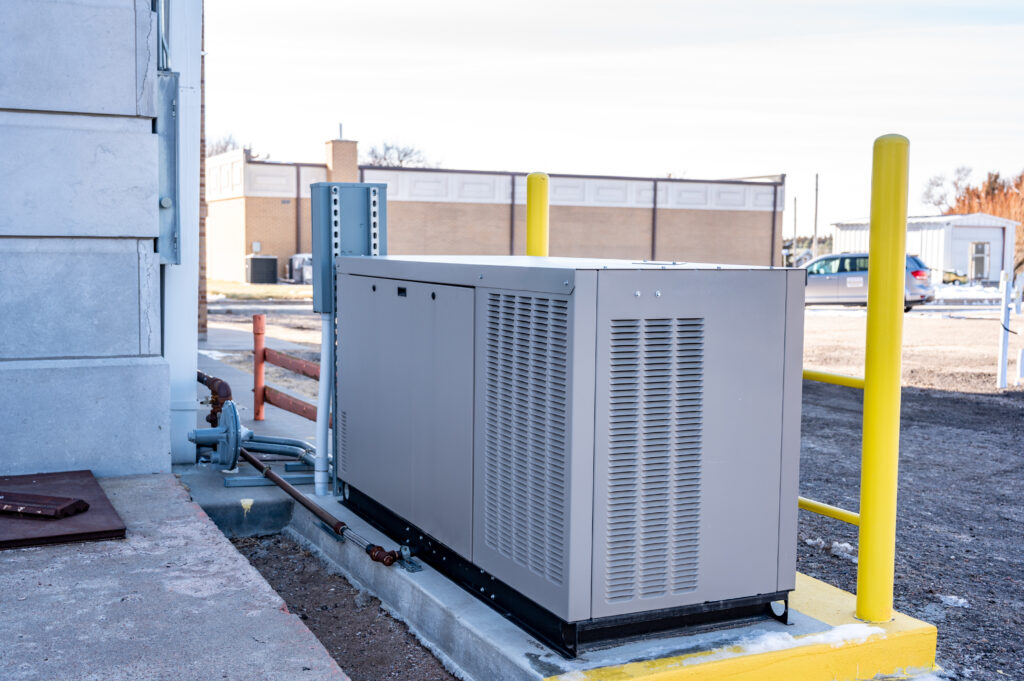
Industrial and commercial generators are essential power sources for businesses, ensuring uninterrupted operations during power outages and emergencies. Three common fuel types used in such generators are propane, diesel fuel, and natural gas. Each fuel type has its advantages and disadvantages, and understanding the differences between them is crucial when deciding on the most suitable generator for your specific needs. In this blog post, we’ll explore the pros and cons of propane, diesel fuel, and natural gas generators, helping you make an informed decision.
Propane Generators
Propane generators rely on liquefied petroleum gas (LPG) stored in tanks, making them highly portable and easy to store. Here are the pros and cons of propane generators:
Pros:
Clean Burning: Propane is considered a clean-burning fuel, emitting fewer harmful pollutants than diesel fuel, which reduces the generator’s environmental impact.
Long Shelf Life: Propane has an indefinite shelf life, ensuring that your fuel won’t degrade or go bad over time, making it ideal for standby generators.
- Versatility: Propane generators can be used both as standby generators for power backup and as portable units for remote locations or temporary power needs.
- Low Maintenance: Propane generators generally require less maintenance compared to diesel generators due to cleaner combustion and fewer components.
Cons:
- Lower Energy Density: Propane contains less energy per volume compared to diesel fuel, meaning you’ll need larger storage tanks and more frequent refueling for the same power output.
- Fuel Availability: Propane may not be as readily available in some areas, potentially limiting its use in remote locations.
- Lower Energy Density: Propane contains less energy per volume compared to diesel fuel, meaning you’ll need larger storage tanks and more frequent refueling for the same power output.
Diesel Fuel Generators
Diesel generators are commonly used in various industrial and commercial applications. They rely on diesel fuel, which is stored in on-site tanks. Here are the pros and cons of diesel fuel generators:
Pros:
- High Energy Density: Diesel fuel has a higher energy density than propane, providing more power output per volume, making it suitable for large-scale applications.
- Fuel Availability: Diesel is widely available, making it easier to source and refill, especially in areas with established fuel infrastructure.
- Durability: Diesel engines are known for their robustness and longevity, making diesel generators highly reliable and suitable for continuous operation.
Cons:
- Emissions: Diesel generators emit more pollutants than propane generators, which could pose environmental concerns, especially in densely populated areas.
- Maintenance: Diesel engines require more regular maintenance due to their complexity and higher internal temperatures.
Natural Gas Generators
Natural gas generators utilize the gaseous form of methane, which is supplied through a direct natural gas line or stored in tanks. Here are the pros and cons of natural gas generators:
Pros:
- Clean Fuel: Natural gas is the cleanest fossil fuel, producing lower emissions of greenhouse gases and pollutants than both propane and diesel fuel.
- Abundant Fuel Supply: In areas with access to natural gas pipelines, the supply is often abundant, providing a reliable and continuous fuel source.
- Lower Fuel Storage Costs: Unlike propane and diesel, natural gas doesn’t require on-site storage tanks, reducing storage-related expenses.
Cons:
- Lower Energy Density: Similar to propane, natural gas has a lower energy density than diesel fuel, necessitating larger engines and more space for the same power output.
- Limited Availability: Natural gas may not be accessible in remote or rural locations, restricting its use in certain areas.
- Limited Availability During Natural Disasters: While natural gas generators are reliable under normal circumstances, they have a significant drawback during natural disasters. If a natural disaster event results in damage to gas pipelines or infrastructure, the supply of natural gas could be disrupted. As a result, a natural gas generator may not function during these critical times, leaving businesses vulnerable without a backup power source.
- Dependency on Infrastructure: Natural gas generators heavily rely on the existing gas infrastructure, which means that if there are any issues with the gas supply lines, such as leaks or ruptures, the generator’s operation can be compromised.
When choosing an industrial or commercial generator, several factors need to be considered, and the fuel type plays a vital role in the decision-making process. Propane generators offer clean burning and easy storage but have lower energy density. Diesel fuel generators, with their high energy density and reliability, may be a suitable option if emissions and maintenance requirements are not primary concerns. Natural gas generators are the cleanest option but may be limited by fuel availability.
In the end, the choice between propane, diesel fuel, and natural gas generators depends on your specific needs, environmental considerations, fuel availability, and budget. By carefully evaluating the pros and cons of each option, you can make an informed decision that best aligns with your business requirements and values. Always consult with a professional generator supplier or expert to determine the most appropriate generator for your specific application.

